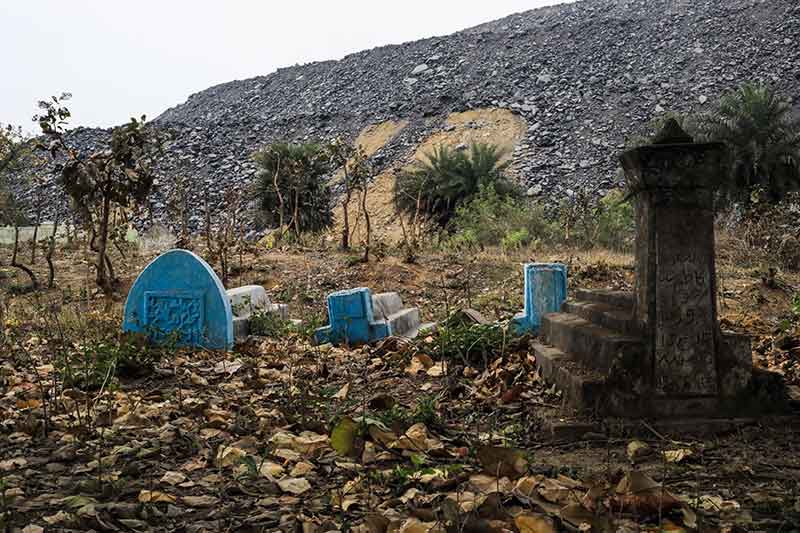Does A Mining Company Respect The Dead?| Countercurrents
No. of course not. They barely respect the living.

In 2016, four young men were killed in a police firing on the 1st of October, during a protest against Thriveni-Sainik and NTPC’s coal mining project at Pakrih Barwadih. The youngest were school going boys and the oldest was only 32, and they were from the villages Sindwari, Sonbarsa, and Chepa-Khurd in Barkagaon block of Hazaribagh district of Jharkhand. A day later, the police laid siege on the villages of Churchu, Chepa-Khurd, and Nagari, where they vandalized property and beat whoever they came upon. The population of these villages had more or less emptied their homes, and disappeared into the fields, or into the homes of distant relatives, or as they say, gone underground.
Today, most of the houses of Sindwari and Sonbarsa have been demolished, the village of Churchu has disappeared, and the graveyard of Nagari doesn’t exist anymore.

The protests have not ceased though, and the villagers claim the complete lack of compensation, and illegal dumping is now at the edge of their lives. Every night, ten to twelve people sleep right next to the dumping site, in two makeshift ‘dharna-sthals’, one built by the Mahtos the other by the Muslims, and if any illegal dumping happens, as it usually happens in the middle of the night, they begin to scream at the trucks and stop them as they can. They have put red flags on top of the dump to mark their territory. And the first thing they say, is that they have been protesting and keeping vigil now for fifteen days.

The company claims that it is dumping on Gair Majurua land, and tells the villagers to go talk to the government. The NTPC officials tell them that if their land is being acquired, they should get jobs. But in a letter dated 28th March, 2024, the villagers claimed that ‘an official told them that if they harass them for jobs, they will forcibly dump on their lands.’ The villagers are demanding justice. They are demanding their rightful employment.
But the government officers give them a minute or two. They usually walk away without saying anything.
No one listens.
Everyone knows no one listens.
They haven’t listened since 2004 when they said they didn’t want mining. That this region was irrigated, multi-crop, that it had seasonal harvests.
Now, they’ve dumped on rivers, dried up the region, and destroyed everyone’s sense of identity itself. Those who were once farmers and landowners, have to beg for compensation and jobs.
A man is on the phone.
Where are you?
Come to where we once beat the CEO.
The protestors laugh.
Now, people claim that anyone who complains against the company ends up with even less compensation than they deserve, and may even be removed from their jobs. Thus, no one comes on record, as it has become the cultural practice of the mining areas in Jharkhand, that live under duress and a repression that has an old name.
A house right next to the over-burden dumping site says they received no compensation.
‘Does anyone come to them to speak to them?’
‘No, they call them to the office.’
An old woman and two young women all laugh but refuse to come on record. Everyone is keeping a roza.

Protests prevented the graveyard of Dadikala from being destroyed which now sits at the edge of the overburden dump. The graveyard of Nagari was destroyed on the night of ‘Shab-be-barat’, the night of forgiveness, the night of freedom or atonement, but here no one could forgive the police force that descended at night and removed a graveyard that had over five centuries of generations.
‘Did the dalaals also dig up their own people?’
‘The dalaals people were also in this kabristan.’
‘Did they dig up the graveyard by hand or by machines?’
They dug everything with machines. Smashed everything to smithereens.
‘Was there anyone from the village of Nagari working that day?’
‘No, they were from outside.’
‘Did anyone see any bones?’
‘Yes. But it’s all covered up again.’
‘Some people from Nagari sold their dead.’
When people point out where the graveyard was, you can only see JCBs, coal dust, and a mark in the middle of the mine. Two men from Mirzapur, Uttar Pradesh are standing at the edge of the mine. They are to perform an external audit. They speak about the development of this nation. We speak about the destruction of the planet. They speak about how people can earn their livelihood. We speak about how we are feeding billionaires while everyone is struggling. They speak about how everything is run by capitalism. We speak about how all the vegetarian billionaires will die first, because at least we can eat meat.

We move on. There is no atonement here, no graveyard but the graveyard of the human race.
Another…
Read More: Does A Mining Company Respect The Dead?| Countercurrents

